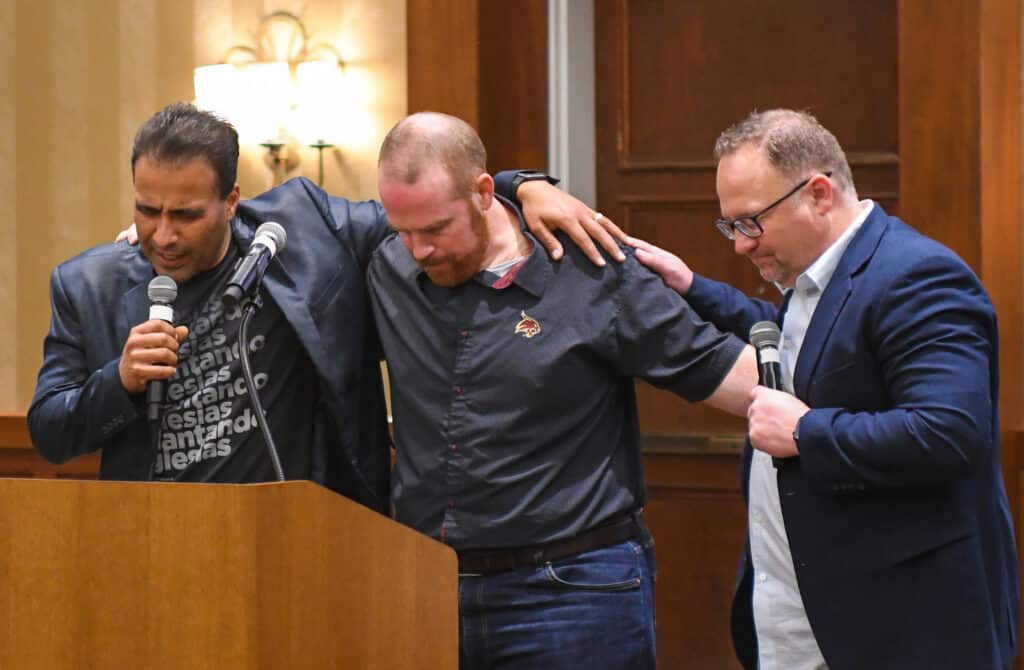I’m running out of magnets to keep my collection of Southern Baptist missionary cards posted on the refrigerator. Years spent in several different states and varied denominational work provided opportunities to watch young adults and not so young adults prepare to serve around the world. I’ve learned to listen to news broadcasts with thoughts of their whereabouts. Whether it’s the heat wave in Paris, the president’s visit to Nairobi, the overthrow of another president in Argentina, flooding in Mozambique, an earthquake in Istanbul, or the proliferation of AIDS in Johannesburg, each event reminds me of the faces of my friends who daily risk their lives to share the gospel.
When my television showed images of planes crashing into the twin towers, it wasn’t long before the link to Muslim extremists turned my attention to a friend in the Middle East. We kept in contact by email, reassuring each other of God’s sovereignty. This time it was she who worried about friends in America, particularly a missionary working amidst the United Nations community. “Eyes glued to the TV, but thoughts a million miles away,” she wrote, “sickened with the idea that what I see is real. The call to prayer begins coming through our window, the sound of the Qur’an. My friends, my neighbors, the people I pass every day on the way to school, to the store, and to the post office are lost?they are going to hell. The pictures in front of me and the sounds of the Qur’an echoing around me drive me to a sustained time of prayer and searching God’s Word for strength and hope?for answers, but most of all for comfort.”
She remembered Jonah questioning how he could go to a place that is so evil, to proclaim God’s message to a people who have harmed her people. And yet, in the midst of “the evil that seems to press down like a dense mist that clings to you,” she found Muslim acquaintances inquiring about her family’s safety. “They expressed their great sadness over what has happened in the U.S. The matter of blame was left unmentioned?as it should have been.” The thought that she could be pulled out of the country at a moment’s notice remained in the back of her mind.
Over the coming months I provided her with a sense of how her homeland had changed. Although spiritual renewal had occurred in many hearts, a distrust of Muslims had also begun. In the midst of those electronic chats, she made some suggestions. “When you come across a Muslim woman in the traditional veil, smile,” she said. She assumed correctly that Muslims in America were sensing the hostility and blame that many people conveyed. That simple act will start to open doors, she said. It was the least I could do.
A year ago I sat at a table in the Missionary Learning Center, enjoying conversation with an IMB leader who had served in a Muslim country. We were comparing notes on the impact of security concerns in Muslim countries where he’d served and others where my friends were ministering. “Did you see this coming?” I asked, wondering whether he had been aware of the influence of Islamic militants during his years overseas. His answer admitted an ineffective strategy in earlier years. Missionaries did not attempt to engage a Muslim culture, he said. Instead, they looked for open doors among responsive people groups. Only recently have we been more creative in finding ways to open the closed doors.
In “Voices Behind the Veil” which you’ll find reviewed on page 11, Ergun Caner observes, “When we were unwilling to go as his ambassadors into the uttermost parts of the world, God brought the uttermost parts of the world to us.” Now that they’re here, will we take offense at the intrusion or introduce them to our Savior?
Too often we focus on the outward appearance, failing to see the person behind the religious garb. Little do we realize it is they who find our culture offensive. In her contribution to the essays, Susie Hawkins says Christians will do well to recognize the virtue that lies behind veiling. “Because Western culture is characterized overseas by television programs that depict a low view of morality, Western Christians can see why Muslims sometimes come to consider Western society as the epitome of evil.” She admitted a slight resentment toward veiled women prior to researching the matter, and wondered why they insisted on dressing in that manner when they lived in the USA. “Now I admire their commitment and desire to identify their faith. I feel drawn to them now, and I fervently pray that this book will do that for all who read it!” She asks God for the grace and opportunities to speak his truth with unveiled love.
Jill Caner identifies with the desire of Muslim mothers to raise children that adhere to their religion and to live productive, meaningful lives. Fourteen years ago God directed Debbie Brunson to pray for Muslim women. She’s seen God call families from each of the churches her husband has pastor














